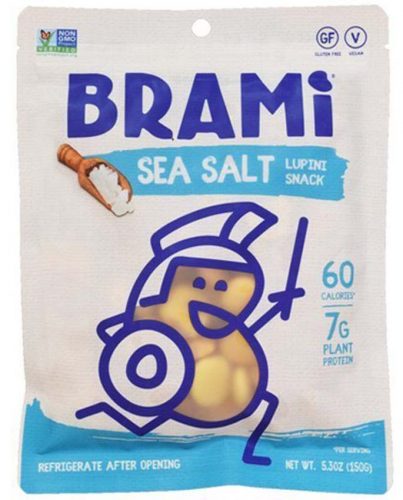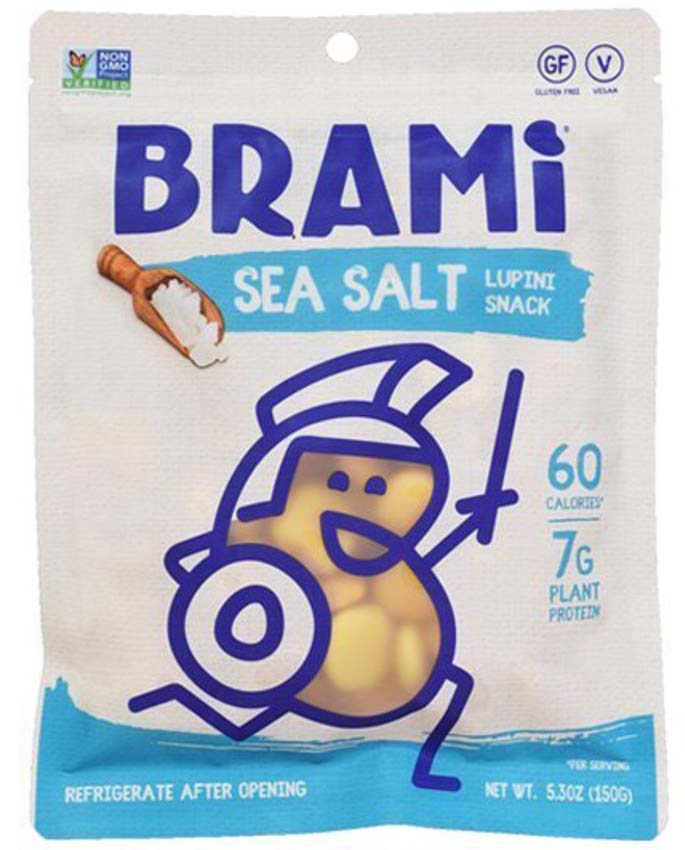It’s Christmas morning, and I am going through my stocking and one of the things that I pull out is this little bag that says BRAMI on it. There was a funny drawing of a bean dressed up like a Roman soldier and the words “The Roman Supersnack”, this was looking very interesting. Being a nutritionist, I am always excited about the possibility of a healthy snack both for myself and my clients. After the initial excitement I wondered what was a Lupini Bean? I looked at the nutritional label, where I usually see the bad news.
WAIT! What’s this? 1 gram of fat, 7 grams of carbohydrates all 7 of them are fiber, so zero net carbs, and 7 grams of protein. This sounds too good to be true, so I go to the ingredient list, the only ingredients are Water, Lupini Beans, Sea Salt, and Organic Vinegar.
How is this possible? How did I not know about this? This little Roman Super Bean could be a huge help to people trying to lose weight, people trying to move to a more vegetarian protein source, decreasing inflammation, or just trying to get some good vitamins, fiber, and minerals in a healthy snack.
But how do they taste? If they taste like cardboard it doesn’t really matter how healthy they are. I open up the bag and pop a few in my mouth. Right away I taste the sea salt and vinegar, a good combo on my palette. The texture of the Lupini Bean is firm but not crunchy, they have a similar texture to soybeans, but not quite as starchy and a little chewier. The overall taste is very mild, so there is more of a salty, vinegar taste than anything else. Overall I think the Lupini Beans are delicious!
So what is a Lupini Bean? I had no idea, so I began to do some research. Turns out that the Lupini Bean has been popular in the Mediterranean for thousands of years. I guess it really is a Roman Super Snack. And the more I researched, the more excited I became.
The Lupini Bean, which also goes by the names lupine seed or lupin, is a member of the legume family , like lentils. Lupini beans are loaded with fiber, protein, B-complex vitamins, and essential minerals.
Macro-nutrients and Fiber
On the BRAMI brand of lupini bean the serving size is about 50 grams (a little less than ½ cup), which in my opinion is a pretty good serving size, because of all of the fiber and protein, these little bad boys are filling.
In each serving of Lupini Beans you are getting one gram of unsaturated fat, which is a relatively small amount compared to the average snack food. That is a big contributor as to why the calories (60 per serving) are so low. Eating good fats, like the fat from the Lupini Beans, not only helps with brain function, but also helps your body absorb certain fat soluble vitamins.
 Each serving contains 7 grams of protein, which not only aids in new cell growth, supports tissue repair, maintains immune system function, but also helps you stay satisfied longer after eating. This was a huge plus to me since I have been moving more in the direction of a plant based diet. But even if you plan on eating pounds of meat every day, getting some good vegetable protein is always a big plus.
Each serving contains 7 grams of protein, which not only aids in new cell growth, supports tissue repair, maintains immune system function, but also helps you stay satisfied longer after eating. This was a huge plus to me since I have been moving more in the direction of a plant based diet. But even if you plan on eating pounds of meat every day, getting some good vegetable protein is always a big plus.
Also helping with that satisfied feeling is the amount of fiber in each serving. You are getting a whopping 7 grams of fiber per serving from BRAMI Lupini Beans. Fiber also helps maintain cardiovascular health and aids in weight control as well as helps to keep you regular.
Like most legumes the Lupini Bean is loaded with vitamins and minerals.
Thiamin
Eating Lupini Beans provides a large amount of thiamin, a vitamin that is needed for the metabolism of fat and carbohydrates. Each serving of Lupini Beans contains about.11 milligrams of thiamin which is 10 percent of your daily recommended intake.
Folate
Lupins also produce 50 micrograms of folate per serving, which is about 7 percent of your daily recommended intake. Most of us know how important folate is to pregnant women, but it is also important for everyone, not just pregnant women. Folate helps your cells metabolize proteins and helps control gene activity.
Zinc
Lupine Seeds will help promote immune function as a result of their zinc content. Eating just one serving of lupine seeds increases your zinc intake by 1.2 milligrams, about 25 percent of your daily recommend intake.
Manganese
The manganese in lupine seeds neutralizes free radicals, preventing cellular damage. It also helps with healthy bone and cartilage growth. Each 50 gram serving of Lupini Beans provides .7 milligrams of manganese which is about 17 percent of the recommended daily amount.
Copper
Copper helps your body process iron, which in tern helps strengthen your blood vessels. It also aids in spinal cord and brain health. Eating just one serving of lupins gives you 21 percent of your daily recommend intake.
Magnesium
Magnesium is one of the most important minerals in our body, it is responcible for over 300 functions in our body and is not typically in American’s diet. Eating lupine seeds for this reason alone makes it well worth it.
I like these wonderful Lupini Beans so much, I contacted BRAMI and am awaiting my first shipment, that’s right, you can now get Lupini Beans right here at the Green Physique. I love them!

